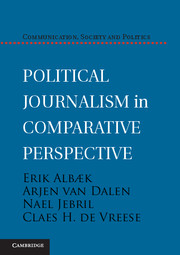Book contents
- Frontmatter
- Contents
- List of Tables and Figures
- Preface
- 1 Introduction
- 2 Comparing Political Journalism
- 3 Journalists
- 4 Journalists and Politicians
- 5 Do Role Conceptions Matter?
- 6 What Type of Journalism Produces Public Knowledge?
- 7 Does Infotainment Journalism Lead to Political Cynicism?
- 8 Good Journalism, Satisfied Citizens?
- 9 Political Journalism
- Appendix to Chapter 2
- Appendix to Chapter 3
- Appendix to Chapter 4
- Appendix to Chapter 5
- Appendix to Chapter 6
- Appendix to Chapter 7
- Appendix to Chapter 8
- References
- Index
Appendix to Chapter 2
Published online by Cambridge University Press: 05 June 2014
- Frontmatter
- Contents
- List of Tables and Figures
- Preface
- 1 Introduction
- 2 Comparing Political Journalism
- 3 Journalists
- 4 Journalists and Politicians
- 5 Do Role Conceptions Matter?
- 6 What Type of Journalism Produces Public Knowledge?
- 7 Does Infotainment Journalism Lead to Political Cynicism?
- 8 Good Journalism, Satisfied Citizens?
- 9 Political Journalism
- Appendix to Chapter 2
- Appendix to Chapter 3
- Appendix to Chapter 4
- Appendix to Chapter 5
- Appendix to Chapter 6
- Appendix to Chapter 7
- Appendix to Chapter 8
- References
- Index
Summary
Political Journalist Survey
To investigate how the personal backgrounds, role conceptions and perceived pressures vary across contexts, a survey was conducted among 425 political reporters in Denmark, Germany, Spain, and the United Kingdom (Appendix Table 2.1). The population under study consists of parliamentary journalists working in these four countries. The populations are defined as “journalists who report, analyze, or give commentary on national politics” and operationalized as members of parliamentary press galleries or of unions of parliamentary journalists. By focusing on parliamentary journalists rather than on general reporters, we have the advantage of functional equivalence, since parliamentary journalists all report on similar topics: government and members of parliament. Since the populations under study are quite small, we opted for approaching the whole population rather than taking a sample.
Between November 2007 and February 2009, the surveys were distributed in each of the four countries. We contacted the journalists by letter and email, inviting them to complete either pen-and-paper or online versions of the survey. Across countries most journalists completed the survey on-line. We used several strategies to increase response rates, such as incentives and multiple follow-up contacts. In Spain and the United Kingdom, additional phone calls were made to increase an initially low response.
Information
- Type
- Chapter
- Information
- Political Journalism in Comparative Perspective , pp. 191 - 199Publisher: Cambridge University PressPrint publication year: 2014
